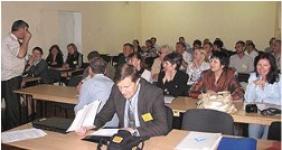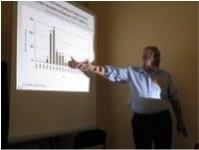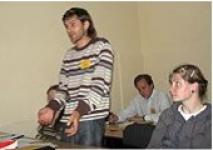The project was conducted by Lena Godlevska between February and June 2009, funded by France (Ministere de l’Ecologie, de l’Energie, du Developpement Durable et de l’Amenagement du Territoire - MEEDDAT), the United Kingdom (Department for Environment, Food and Rural Affairs - DEFRA) and the EUROBATS Secretariat in the framework of the EUROBATS Projects Initiative (EPI).
Bats are still one of the least known groups of mammals in Ukraine, both for the general public and the public health authorities dealing with bats (sanitary and epidemiological service (SES), veterinarians, epidemiologists). Usually people finding bat colonies or single bat specimens in their house apply to SES (considering bats as rodents (= pests)). As has been demonstrated, in such cases SES and other health authorities have not had consistent answers adequate to the recognised conservation status of bats. In the last 50 years Ukrainian public health authorities have dealt with three fatal human rabies cases following bat bites. These cases are regularly quoted but without information about the conservation status of bats and their vulnerability (which provokes a negative altitude to bats and is thus a threat). Until now in Ukraine no systematic bat rabies surveillance has been carried out and a current system of data collection can’t give a clear picture about bat rabies in Ukraine.
In view of all pointed above an aim became obvious: it was important to change the situation and to realise some steps toward improving bat conservation in Ukraine by distribution of knowledge about bats and necessity of their protection through public health authorities and development of collaboration between them and zoologists both at level of ministries and at level of person experts from each "side".
It was as well clear that a general working meeting (workshop) was necessary: 1) to circulate an information through public health authorities about bats and to establish a basical collaboration between all sides; 2) to discuss a new strategy and implementation of modern methods of bat rabies surveillance in Ukraine.
The workshop, named “Bats and man: conservation and epidemiological aspects”, was held during two working days in suburbs of Kiev in May 2009. It was attended by 44 participants (bat workers, SES biologists, physicians, veterinarians, virologists) from 22 cities of Ukraine. For highlighting questions of surveillance of bat rabies in Europe a lector was invited — P. Lina (the Netherlands). A group of bat workers took part in organisation of the workshop — L. Godlevska, V. Domashlinets, M. Ghazali, M. Korobchenko, V. Tyshchenko, A. Vlaschenko, I. Zagorodniuk.
The workshop presentations had been divided into two topics: 1) Introduction to bats (biology, Ukrainian bat fauna, roosts, life cycle, bats and man, vulnerability, conservation status, necessity for protection); 2) rabies in bats (virology, up-to-date research methods, review of results of bat rabies monitoring and investigations in European countries, reaction to bite cases, maintenance of bat colonies with rabid individuals, EUROBATS Resolution 5.2 etc.).
A round table discussion took place on a scheme of SES-work with the general public on consulting people concerning bats in houses; actions of SES following incidents of contact of citizens with bats; concordance of tasks for nature conservation and sanitation education.
The workshop participants adopted a resolution stating a series of important issues concerning the improvement of bat conservation practice and bat rabies surveillance in Ukraine. In frames of the project two printing colourful issues were prepared — a booklet “Bats and rabies” (16 pages) and a leaflet “Our neighbours bats” (8 pages). The “Bats and rabies” booklet is on conservation of bats and rabies in European bats (a special attention is given to EUROBATS Resolution 5.2). The leaflet “Our neighbours bats” represents a clear information about bats in houses, their harmlessness to people and explains why bats can’t be excluded from their roosts in houses. Booklets and leaflets are send to public healthy authorities throughout all Ukraine (from all district SES and to research institutes). The leaflet is aimed for distribution as well among people dealing with bats in houses.
The project was financially supported by the Ministere de l’Ecologie, de l’Energie, du Developpement Durable et de l’Amenagement du Territoire (MEEDDAT), France; the Department for Environment, Food and Rural Affairs (DEFRA,) UK, and the EUROBATS Secretariat in the framework of the EUROBATS Projects Initiative (EPI).




